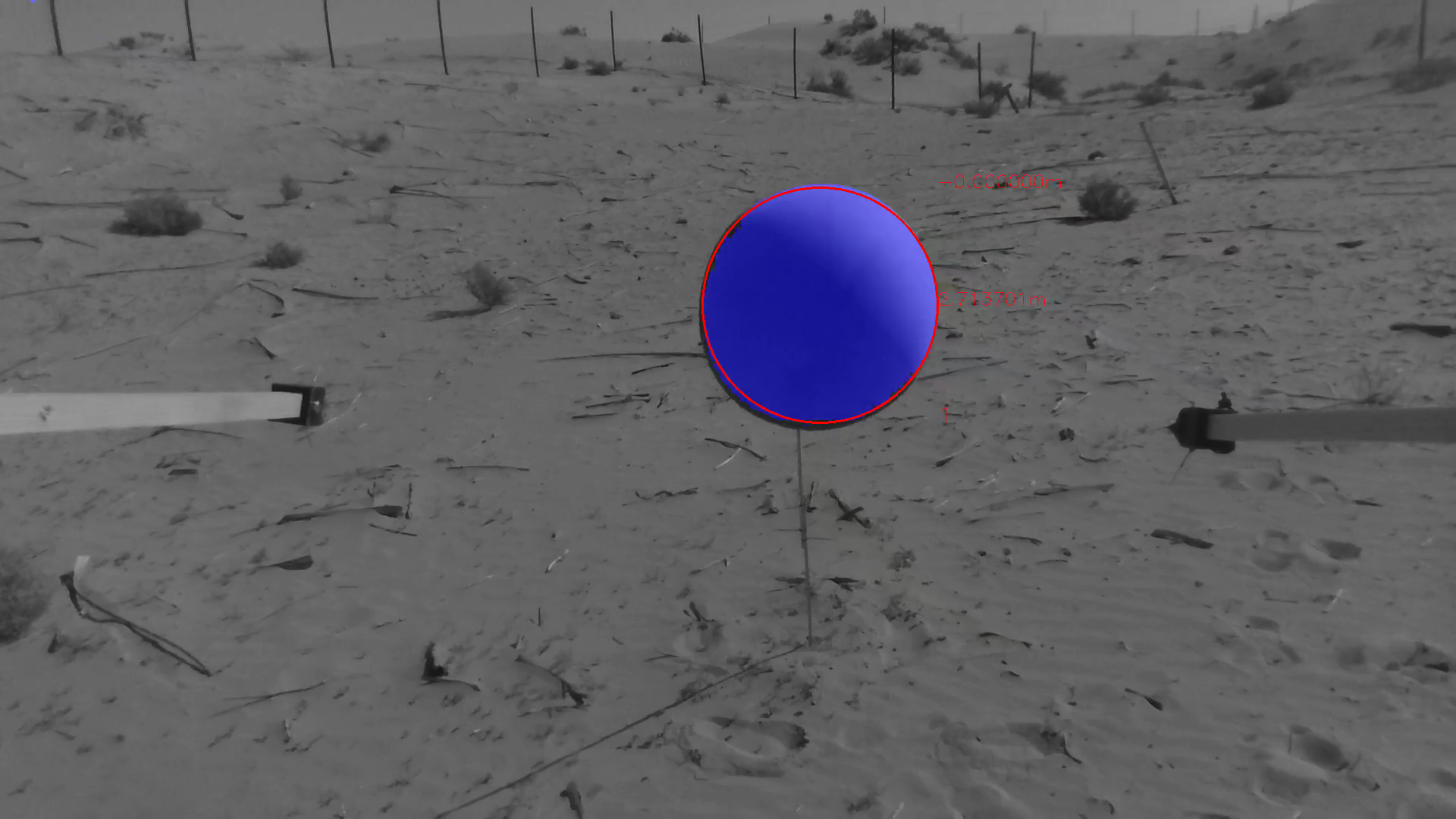| Build status |
|---|
This repository contains the object_detect package, which is developed at the MRS group for detection and position estimation of round objects with consistent color, such as the ones that were used as targets for the MBZIRC 2020 Challenge 1.
It contains a detector that takes RGB images as an input, detects the targets using color segmentation, and estimates positions of the targets relative to the camera based on their known physical dimensions and their apparent sizes in the image.
Optionally, the detector can also use a depth image (such as that from a Realsense D435 camera) to improve the position estimation of the target.
The algorithm is implemented using LUT and optional HW acceleration using OpenCL and is described in [1].
This repository contains a ROS package and therefore requires ROS to be installed (tested with ROS Noetic on Ubuntu 20.04).
The package requires the mrs_lib library, which can be installed separately or together with the MRS UAV System [2].
If you want to utilize hardware acceleration using OpenCL, you need to have OpenCL installed (should be straight-forward using the apt package manager).
To use this program, you have to specify the set of valid color (either in HSV or Lab) and the physical dimensions of the target.
An example is provided in the Red.yaml config file.
The format of the config file is as follows:
# compulsory parameter namespace
ball:
# this name can be anything, but it should describe the color being segmented
segment_color_name: Green
# this parameter specifies the physical diameter of the object for distance estimation
# from its apparent size in the image
physical_diameter: 0.65
# which method to use for specification of the set of valid color
# possible values are: 'HSV', 'LAB', 'HS_LUT', 'AB_LUT'
binarization_method_name: HSV
# these values will be used if the 'HSV' binarization method is selected
hsv: {hue_center: 52.654596807119056, hue_range: 22.608414373005395, sat_center: 99.92753623188406,
sat_range: 160.25069282432074, val_center: 117.91439449766642, val_range: 925.6251866270163}
# these values will be used if the 'LAB' binarization method is selected
lab: {a_center: 106.46094325718497, a_range: 3.75860395761193, b_center: 149.30987472365513,
b_range: 11.129277064718911, l_center: 117.29145173176124, l_range: 923.0698135303048}
# these values will be used if the 'HS_LUT' or 'AB_LUT' binarization method is selected
lut: {data: {...}, subsampling: {x: 1, y: 1, z: 1}}There are four methods of binarizations that algorithm can utilize:
HSV- uses the Hue, Saturation, Value model of the color space. Valid colors are specified as ranges in this color space which are used to threshold the input image.LAB- uses the Lab* (also reffered to as CIELAB) model of the color space. Valid colors are specified as ranges in this color space which are used to threshold the input image.HS_LUT- uses a Look-Up Table (LUT) from RGB to 0/1, where 0 indicates invalid color and 1 indicates valid color. The fastest method.AB_LUT- same asHS_LUT(these two are separate for historical reasons).
For selecting the sets of valid colors (parameters of the above mentioned methods), it is recommended to use our dedicated semi-automatic color selection tool Color Picker, which provides live color range selection and LUT creation (using a camera topic from ROS). The tool is integrated with this package, allowing on-the-fly tuning.
If you use this work, please consider citing [1].
- [1]: Y. Stasinchuk, M. Vrba, M. Petrlík, T. Báča, V. Spurný, D. Heřt, D. Žaitlík, T. Nascimento and M. Saska, "A Multi-UAV System for Detection and Elimination of Multiple Targets," accepted to ICRA 2021.
- [2]: T. Báča, M. Petrlík, M. Vrba, V. Spurný, R. Pěnička, D. Heřt and M. Saska, "The MRS UAV System: Pushing the Frontiers of Reproducible Research, Real-world Deployment, and Education with Autonomous Unmanned Aerial Vehicles", eprint arXiv: 2008.08050, accepted to JINT 2021 (https://arxiv.org/abs/2008.08050).
Matouš Vrba <vrbamato@fel.cvut.cz>
Yurii Stasinchuk <stasiyur@fel.cvut.cz>
Multi-Robot Systems mrs.felk.cvut.cz
Faculty of electrical engineering,
Czech Technical University in Prague
